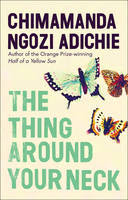
After reading Karen at
BookBath's post on
Olive Kitteridge by Elizabeth Strout today, a novel that is on my summer
reading list, I thought it was time to share a relevant ongoing personal reading challenge that I am attempting. Along with reading the
Man Booker winners (and in the longterm also the nominees) and working my way through the Guardian's
1000 Novels, I am also planning to read all the winning novels of the Pulitzer Prize for Fiction (known as the Pulitzer Prize for the Novel prior to 1948). This is the ongoing reading challenge that I have read the least for so far but I'm planning on chalking up a few in the coming months, starting with the most recent winner,
Olive Kitteridge, and followed up by the winner from the previous year,
The Brief Wondrous Life of Oscar Wao and then
Interpreter of Maladies and
The Color Purple, both of which I have been wanting to read for what seems like forever.
March by Geraldine Brooks has also caught my eye a few times recently.
Striked through are novels read; in red are the ones I own but are unread.
2009 Olive Kitteridge by Elizabeth Strout2008 The Brief Wondrous Life of Oscar Wao by Junot Diaz
2007 The Road by Cormac McCarthy
2006 March by Geraldine Brooks
2005 Gilead by Marilynne Robinson
2004 The Known World by Edward P. Jones
2003 Middlesex by Jeffrey Eugenides
2002 Empire Falls by Richard Russo
2001 The Amazing Adventures of Kavalier & Clay by Michael Chabon
2000 Interpreter of Maladies by Jhumpa Lahiri
1999 The Hours by Michael Cunningham
1998 American Pastoral by Philip Roth
1997 Martin Dressler: The Tale of an American Dreamer by Steven Millhauser
1996 Independence Day by Richard Ford
1995 The Stone Diaries by Carol Shields
1994 The Shipping News by E. Annie Proulx
1993 A Good Scent from a Strange Mountain by Robert Olen Butler
1992 A Thousand Acres by Jane Smiley
1991 Rabbit at Rest by John Updike
1990 The Mambo Kings Play Songs of Love by Oscar Hijuelos
1989 Breathing Lessons by Anne Tyler
1988 Beloved by Toni Morrison
1987 A Summons to Memphis by Peter Taylor
1986 Lonesome Dove by Larry McMurtry
1985 Foreign Affairs by Alison Lurie
1984 Ironweed by William Kennedy
1983 The Color Purple by Alice Walker
1982 Rabbit is Rich by John Updike
1981 A Confederacy of Dunces by John Kennedy Toole
1980 The Executioner's Song by Norman Mailer
1979 The Stories of John Cheever by John Cheever
1978 Elbow Room by James Alan McPherson
1977 -
1976 Humboldt's Gift by Saul Bellow
1975 The Killer Angels by Michael Shaara
1974 -
1973
The Optimist's Daughter by Eudora Welty (read and reviewed
here 03/08/09.)
1972 Angle of Repose by Wallace Stegner
1971 -
1970 Collected Stories by Jean Stafford
1969 House Made of Dawn by M. Scott Momaday
1968 The Confessions of Nat Turner by William Styron
1967 The Fixer by Bernard Malamud
1966 Collected Stories by Katherine Anne Porter
1965 The Keepers of the House by Shirley Ann Grau
1964 -
1963 The Reivers by William Faulkner
1962 The Edge of Sadness by Edwin O'connor
1961 To Kill a Mockingbird by Harper Lee
1960 Advise and Consent by Allen Drury
1959 The Travels of Jaimie McPheeters by Robert Lewis Taylor
1958 A Death in the Family by James Agee
1957 -
1956 Andersonville by Mackinlay Kantor
1955 A Fable by William Faulkner
1954 -
1953 The Old Man and the Sea by Ernest Hemingway
1952 The Caine Mutiny by Herman Wouk
1951 The Town by Conrad Richter
1950 The Way West by A.B. Guthrie
1949 Guard of Honor by James Gould Cozzens
1948 Tales of the South Pacific by James A. Michener
1947 All the King's Men by Robert Penn Warren
1946 -
1945 A Bell for Adano by John Hersey
1944 Journey in the Dark by Martin Flavin
1943 Dragon's Teeth by Upton Sinclair
1942 In This Our Life by Ellen Glasgow
1941 -
1940 The Grapes of Wrath by John Steinbeck
1939 The Yearling by Marjorie Kinnan Rawlings
1938 The Late George Apley by John Phillips Marquand
1937 Gone With the Wind by Margaret Mitchell
1936 Honey in the Horn by Harold L. Davis
1935 Now in November by Josephine Winslow Johnson
1934 Lamb in His Bosom by Caroline Miller
1933 The Store by T.S. Stribling
1932 The Good Earth by Pearl S. Buck
1931 Years of Grace by Margaret Ayer Barnes
1930 Laughing Boy by Oliver Lafarge
1929 Scarlet Sister Mary by Julia Peterkin
1928 The Bridge of San Luis Rey by Thornton Wilder
1927 Early Autumn by Louis Bromfield
1926 Arrowsmith by Sinclair Lewis
1925 So Big by Edna Ferber
1924 The Able McLaughlins by Margaret Wilson
1923 One of Ours by Willa Cather
1922 Alice Adams by Booth Tarkington
1921 The Age of Innocence by Edith Wharton
1920 -
1919 The Magnificent Ambersons by Booth Tarkington
1918
His Family by Ernest Poole
Having read only 7/83 of these novels, I'm thinking that this may take me some time! If I manage to read the five novels mentioned above the list, then I will be delighted. My Guardian 1000 and Man Booker projects take precedence, especially as the Man Booker is more achievable with only thirty or so novels still to read.
Moreover, I haven't even heard of some of these novels and think that prior to the 1940s, at least, they may be quite difficult to obtain. I consider myself to have read quite a lot of American Literature but I feel myself quite lacking in relation to this list. I imagine that some of these are far more well-known on the other side of the pond than they are here. Have you read any winners from this list that I haven't? What books would you recommend?


























